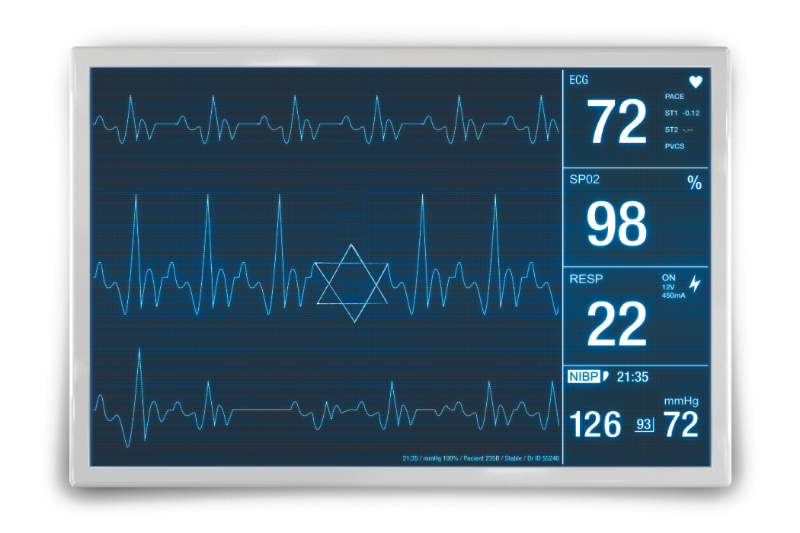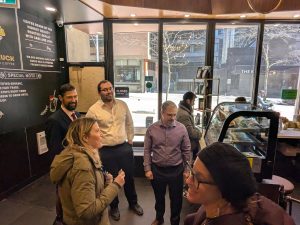It’s been almost four years since terminally ill Canadians have had the legal right to a medically assisted death, but for patients in Jewish nursing homes, there is no guarantee they will be able to choose how and where they die.
Across the country, Jewish long-term care homes have grappled with the legislation, with some permitting medical assistance in dying (known widely as MAiD), and others strictly forbidding it. The differences reflect the lack of consensus in the Jewish community, which is starkly divided on the topic.
At the heart of the matter is an impossible standoff: How can faith-based nursing homes respect a law that allows medical professionals to administer drugs that end a patient’s life when it collides head-on with Jewish beliefs that forbid causing death and are the institution’s very underpinnings?
The problem isn’t simply a philosophical one. Megan Greenberg faced this dilemma in May 2017, when her mother, Dr. Devorah Greenberg, suffering from Parkinson’s disease and a resident at Louis Brier Home & Hospital in Vancouver, asked for and was approved for MAiD, as the law requires. The nursing home, however, does not permit MAiD on its site.
Megan Greenberg, her mother, a rabbi and the British Columbia Civil Liberties Association presented letters to the home’s board asking for a change in policy.
“I appreciate that your decisions are complex and that procedural changes take time. In the interim, others with cases similar to mine may come forward seeking similar procedural change. Let it begin with me. Please let me die at home,” Devorah Greenberg wrote.
The home would not be swayed.
In an essay posted on the website of Dying With Dignity Canada, Megan Greenberg wrote that her mother was transferred to a clinic, which was made as homey as possible with her mother’s paintings and pillows, for the procedure.
“She was, and I will always be, grateful for the right to access MAiD and for the love and care that surrounded her last days. The only sadness she felt was that she was removed from her home,” she wrote.
Just a month after Devorah Greenberg’s death, a similar situation arose again at Louis Brier, but this time, rather than transfer the patient – Barry Hyman, 83, who had lung cancer and suffered a stroke – a doctor sneaked into the home to provide MAiD.
The home filed a complaint against Dr. Ellen Wiebe with the College of Surgeons and Physicians of British Columbia, but the college decided not to censure Wiebe and dismissed the complaint.
Since then, the home has tightened up its physician privileges, but its position has not changed, said Louis Brier’s CEO, David Keselman, in an interview.
“We follow the Orthodox stream of Judaism, and according to that, MAiD is considered to be a suicide, and Judaism doesn’t support suicide,” he said.
“Being a publicly funded organization, we will never turn anyone away, but consciously, the decision was made that we as a Jewish organization need to follow a certain path in Judaism.”
Faith-based institutions were forced to consider where they stood on MAiD in 2015, when the Supreme Court of Canada overturned a decades-old decision and gave the federal government a tight timeline to legalize the process. The law, passed in June 2016, requires patients who have a “grievous and irremediable condition” to be assessed by two different health-care providers and to be able to give consent on the day of their death in order to be eligible for MAiD.
Since then, there have been at least 6,749 medically assisted deaths, about one per cent of all deaths in Canada, according to Health Canada.
The federal government has just finished holding consultations on whether to broaden the law, permitting among other changes, advanced requests for assisted dying and including “mature minors” in its provisions.
Jewish nursing homes have responded to MAiD in a variety of ways. Louis Brier tells families entering the facility that it does not permit MAiD, but does allow the assessments to be conducted in the home. To date, three transfers from the home have occurred for the procedure, Keselman said.
Ottawa’s Hillel Lodge is one of the few Jewish care homes that puts its opposition to MAiD in black and white in its resource guide for families, stating, “While we respect the authority of the government/Supreme Court of Canada, and the individual’s right to choose, medical assistance in dying contravenes Jewish values and ethics and is not supported by Hillel Lodge.”
CEO Ted Cohen says Hillel Lodge consulted with other faith-based nursing homes before coming up with its position.
“Our approach, which we saw as both respectful and in alignment with our traditional Jewish values, was very much what other faith-based homes were doing,” Cohen said in an interview.
Hillel Lodge will refer patients who want to be assessed for MAiD, but so far the issue has not arisen. Putting the policy in the resident handbook helps patients consider a variety of important end-of-life issues, he said.
Other Jewish homes, including the Saul and Claribel Simkin Centre in Winnipeg, the Donald Berman Jewish Eldercare Centre and the Donald Berman Maimonides Geriatric Centre in Montreal, permit MAiD.
In Toronto’s Baycrest, Canada’s largest Jewish elder care complex, MAiD is permitted in the Apotex Centre Jewish Home for the Aged and the Terraces retirement residences (independent assisted living), but not in its hospital. Patients in the hospital would be transferred for MAiD, a situation that has not arisen, according to a statement from Baycrest.
“Baycrest balances our Jewish faith-based principles with a client-centred approach that respects the client’s right of self-determination, while also adhering to applicable legislation,” said the statement.
Advocates of MAiD argue that allowing faith-based institutions to opt out of providing the procedure is dangerous.
While individuals have the right to conscientiously object to MAiD, “bricks and mortar can’t,” said Dr. Jonathan Reggler, a MAiD provider and a board member of Dying With Dignity Canada.
“That an organization can (prohibit MAiD) is abhorrent, given the consequences I have seen.”
Transferring terminally ill people out of the nursing home can cause them to lose the capacity to consent to MAiD before the procedure. In some instances, patients will refuse painkillers, although the transfer may be quite difficult, to preserve their ability to consent to the procedure, he said.
Waiting lists for nursing home beds can be long, and patients and their families can feel as if they have no choice but to accept any placement, even if the home does not permit MAiD. In many cases, patients are not aware of the policy until the time comes when they need it, Reggler said.
Eventually, Reggler believes, a court case will force all publicly-funded institutions, including faith-based ones, to provide MAiD. Reggler was involved in one case where the family was considering going to court, but the patient was so sick, they wouldn’t live long enough to get an emergency injunction, he said.
Institutions that receive public funding, which would include almost every health-care facility in Canada, have an obligation to provide MAiD, he believes.
“For organizations to prohibit MAiD on their sites, when they are serving the general public, is disgraceful.”

Rabbi Chaim Strauchler, who leads Toronto’s Orthodox Shaarei Shomayim synagogue, is as staunch as Reggler is, but he opposes MAiD, calling it “murder.”
“This is a person administering a drug that will kill someone. Whatever Orwellian language we use for it, it still is what it is,” he said in an interview.
Rabbi Strauchler was an outspoken critic of MAiD before the legislation was passed, crafting a petition signed by more than two dozen other rabbis that pointed out what he saw as the pitfalls of the proposed law.
Since then, his concerns about MAiD have been realized, he said.
“In speaking to families, I’ve had a number of families tell me about well-meaning medical conversations that led them to feel pressured to consent to MAiD,” he said.
Families see their parents “being invited into dying,” a situation he says is “immoral.”
The law has also placed physicians in an untenable position, he says. The Ontario College of Physicians and Surgeons recognizes a physician’s right to conscientiously object to MAiD, but requires them to refer patients to a health-care worker who can assess them. That policy was challenged as unconstitutional and was upheld by the Ontario Court of Appeal in 2019.
Physicians in his congregation have told Rabbi Strauchler “they feel pressure seeing their institutions providing (MAiD) in ways that are wrong.”
Some Jewish physicians have joined a campaign, supported by Christian religious organizations, that calls for physicians who have a conscientious objection to MAiD to be removed from the responsibility to refer patients.
The solution, Rabbi Strauchler said, is not to broaden the reach of MAiD, as the government’s consultations indicate may happen, but to make palliative care more accessible and improve funding for it.
“Suffering at the end of life is very real,” Rabbi Strauchler says. “Palliative experts are able to care for the pain.”
The problem of doctors feeling compelled to participate in MAiD was one that the Centre for Israel and Jewish Affairs (CIJA) also flagged when it testified before a parliamentary committee shortly before the law was passed.
CIJA acknowledged at the time that there was no consensus on the issue within the Jewish community, something that has not changed in the intervening years.
“We remain concerned about the coercive element that effectively forces individual health-care providers to be engaged in a process regarding which they have conscientious or religious objections, and we will continue to relay those concerns to government,” CIJA CEO Shimon Koffler Fogel said in a statement to The CJN.
Rabbi Jordan Cohen, a Reform rabbi at Temple Anshe Sholom in Hamilton, Ont., once also opposed MAiD, but as he saw members of his own congregation choose MAiD, his opinion changed.
Before MAiD became law, Rabbi Cohen said he took a traditionalist view. “I would say we are prohibited from doing anything that would take a life.” Then, all of a sudden, the issue “became real” when three members of the synagogue opted for medical assistance in dying.
“These were people who lived strongly connected Jewish lives, but they were also suffering. It wasn’t an easy out, nobody approached it lightly,” Rabbi Cohen said.
In the end, after reviewing the rabbinic literature on the topic and the Canadian law, he changed his mind.
In the sermon he delivered on Yom Kippur in 2017, he told his congregation exactly that.
“I believe in the sanctity of life. As such, I support the right to die well – or at least as well as possible,” he told his congregants. “When death is inevitable within a short time frame and suffering is unavoidable, those who are in a position to do so should assist a person who wishes to die to do so, with compassion and dignity. Whether one chooses that option or not is a matter of personal choice.”







